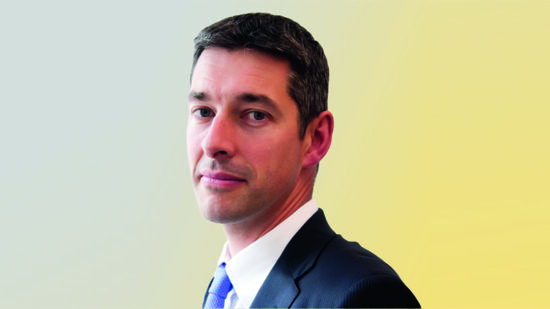Brewin Dolphin head of wealth and investment management Stephen Ford has watched the firm grow dramatically during his 15-year tenure at the company. As Brewin Dolphin has become one of the biggest names in the UK wealth sector, Ford’s career has progressed in parallel.
He started his career in the late ’80s in a very different field, as a graduate trainee with supermarket Sainsbury’s. He became a manager with the retail giant before moving into financial services. “I worked in building societies,” Ford says. “I was at Bradford & Bingley, Cumberland and then the Building Societies Association. During that time, I realised I quite fancied the investment management side of financial services, so I moved on to work for an IFA businesses in London. Then Brewin Dolphin advertised for an investment assistant and I got the job. ”The move to Brewin Dolphin in 2000 was, in hindsight, clearly the right one. Ford set about moving up the ranks to ultimately lead the wealth business.
Further steps
“We have been on quite a journey at the firm. When I joined it was a stockbroker and then later it began to move towards investment management. Now, we have taken a further step into wealth management,” he says.
His focus in recent times has been on “positioning the business for growth”, he says. “We have reinvented ourselves in the past five years. We have reshaped the branch networks and have been looking at how to raise margins to fuel growth. Having built this platform, we are outward looking and growth focused.
”Ford’s approach is informed by two key principles: that integrity is paramount and that financial services are essentially about people. “Financial services can be focused on performance figures but what is really important is whether clients have enough money to meet their needs and goals. “I think we are building a firm around integrity and humanity. It is important to develop relationships with clients where they feel in control, without them having to understand everything about an investment.
“That can, of course, be tricky with things such as regulatory pressures, and terms and conditions having to be longer than Hamlet,” he says. One of Ford’s biggest concerns is the tendency within wealth management to overcomplicate things in a way that drives a wedge between client and provider.
“Something that bothers me about financial services in general is that what we do is actually very simple, but that does not come across. Our job is to connect people to risk assets that are within their risk appetite and help them achieve their goals.” Losing sight of this, Ford says, can push prospective clients to look elsewhere when deciding what to do with their wealth.
“At the moment, risk assets comprise a much broader range of things than tradable securities. It is easy to go and invest in a buyto-let property or a classic car, for example. It is also now much easier to invest your own money through a platform. “We believe it is vital to simplify the process of using a wealth manager and challenge ourselves at each step in the process to make it easier for the customer.”
Advocating transparency
Transparency has been a huge issue for wealth firms over recent years and is likely to be so for some time to come. This is not something Ford shies away from. “I believe that as an industry we should want to be transparent. I believe we do a good job, so we should be proud to be transparent,” he says.
“In what other industry would a customer be expected to buy something without knowing the full costs? We are putting pounds and pence fees on our website even where we do not have to. We as an industry need to respond to that question and it can only benefit us to do so.”
Ford is far from without support in this endeavour; he is backed by his “highly capable” head of research Guy Foster and a large team of investment professionals. “I am blessed to have a good team of people to work with. We have 28 people looking at the various asset classes.”







